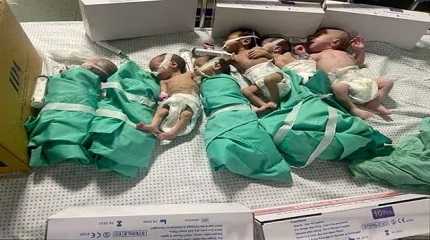
GAZA/JERUSALEM, Nov 12 (Reuters) - Two major hospitals in northern Gaza closed to new patients on Sunday, with staff saying that Israeli bombardment plus lack of fuel and medicine meant babies and others could die.
Hospitals in the north of the Palestinian enclave are blockaded by Israeli forces and barely able to care for those inside, medical staff said. Israel says it is homing in on Hamas militants in the area and the hospitals should be evacuated.
Gaza's largest and second largest hospitals, Al Shifa and Al-Quds, said they were suspending operations. With more people killed and wounded daily, there are ever fewer places for the injured to go.
"My son was injured and there was not a single hospital I could take him to so he could get stitches," said Ahmed al-Kahlout, who was fleeing south in accordance with Israeli advice while fearing that nowhere in Gaza was safe.
A plastic surgeon in Shifa said bombing of the building housing incubators had forced them to line up premature babies on ordinary beds, using the little power available to turn the air conditioning to warm.
"We are expecting to lose more of them day by day," said Dr Ahmed El Mokhallalati.
Israel says Hamas has placed command centres under and near the hospitals and it needs to get at them to free around 200 hostages the militants took in Israel in an attack just over a month ago. Hamas has denied using hospitals in this way.
On Sunday a Palestinian official briefed on talks over the release of hostages said Hamas had suspended the negotiations because of the way Israel had handled Shifa hospital.
There was no immediate comment from either Hamas or Israel.
'NO ONE IS ALLOWED IN, NOBODY IS ALLOWED OUT'
Israel's chief military spokesperson, Rear Admiral Daniel Hagari, had said the military would help evacuate babies from Shifa on Sunday. But Qidra said they had not been told how to get the babies to safety. He said that of 45 babies in total, three had already died.
Israeli Prime Minister Benjamin Netanyahu said the hospital had been offered fuel but had refused it. The Israeli military said it had placed 300 litres of fuel at Shifa's entrance on Saturday night but, the statement added, Hamas had blocked the handover.
Muhammad Abu Salmiya, the director of Al Shifa Medical Complex, denied that, telling Qatar's Al Araby TV: "The occupation’s claims of refusing to receive 300 litres of diesel fuel are lies and slander, and all departments are closed due to running out of fuel, except for the emergency department."
Shifa was out of reach for the newly wounded, said Mohammad Qandil, a doctor at Nasser Hospital in Khan Younis in south Gaza, who is in touch with colleagues there.
"Shifa hospital now isn't working, no one is allowed in, nobody is allowed out," he said.
The Palestinian Red Crescent said Al-Quds hospital was also out of service, with staff struggling to care for those already there with little medicine, food and water.
"Al Quds hospital has been cut off from the world in the last 6-7 days. No way in, no way out," said Tommaso Della Longa, spokesperson for the International Federation of Red Cross and Red Crescent Societies.
With the humanitarian situation across Gaza worsening, 80 foreigners and several injured Palestinians crossed into Egypt in the first evacuations since Friday, four Egyptian security sources said.
Poland said 18 of them were its citizens, and U.S. National Security Advisor Jake Sullivan told CBS News American citizens would be moved out of Gaza during Sunday.
AID DELIVERIES BY TRUCK AND PARACHUTE
At least 80 aid trucks had also moved from Egypt into Gaza by Sunday afternoon, two of the sources said. Jordan said earlier it had air-dropped a second batch into a field hospital.
Very little aid has entered Gaza since Israel declared war on Hamas more than a month ago after militants rampaged through southern Israel, killing about 1,200 people and taking more than 200 hostages, according to Israeli officials.
Palestinian officials said on Friday that 11,078 Gaza residents had been killed in air and artillery strikes since then, around 40% of them children.
Disease is spreading among evacuees packed into schools and other shelters and surviving on tiny amounts of food and water, international aid agencies say.
Speaking from inside Gaza City, Jamila, 54, said she and her family could hear the roar of tanks nearby.
"During the day, people try to look for essential items such as bread and water, and at night people try to stay alive," she said. "We hear explosions throughout the night, sometimes we can tell that some of these explosions are exchanges of fire between the resistance fighters and the Israeli forces."
The mother-of-six said her family was scared to leave.
"We hear lots of bombings in the south, and there is no food. Things there don't seem different from our situation here," she said by phone, giving only her first name.
Palestinian health officials said 13 people had been killed in an Israeli air strike on a house in Khan Younis in southern Gaza on Sunday.
Residents reported increased fighting around Al-Shati refugee camp, by the coast in northern Gaza. The Israeli military said it had killed a number of militants there and called on civilians to use a four-hour pause to evacuate south.
The Gaza fighting has reignited conflict on Israel's northern border with Lebanon, which has seen the worst cross-border clashes since 2006.
Lebanon's Hezbollah group, which like Hamas is backed by Iran, said it attacked Israeli army troops near the Dovev Barracks on Sunday, inflicting casualties.
The Israeli military said earlier that anti-tank missiles fired by militants had hit a number of civilians, adding that it was retaliating with artillery fire.
The U.N. peacekeeping force in Lebanon said one of its members near the town of Al-Qawzah in southern Lebanon had been wounded by a bullet overnight.




